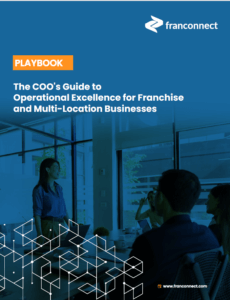Franchise operators no longer must react to performance issues after they impact the bottom line. Today, artificial intelligence-powered franchise analytics software is transforming how multi-location brands identify, predict, and prevent location underperformance, often before operators even realize there’s a problem brewing.
“We didn’t know what we didn’t know,” an Operations Director at a mid-market QSR franchise with over 120 locations might say. “We were always playing catch-up, only discovering performance issues after they’d already cost us thousands in lost revenue. By then, the damage was done.”
This reactive approach to franchise management isn’t only frustrating but also expensive. According to franchise industry experts, addressing underperforming locations early is far more cost-effective than attempting to turn them around after significant decline has occurred. As one franchise business publication notes, “identifying and managing underperformance often requires franchisor intervention” because once a location begins struggling, the challenges compound quickly.
The good news? Advanced AI-powered analytics are changing the game. By detecting subtle patterns in operational data that humans simply can’t see, these systems are giving franchise operators unprecedented foresight into performance issues, often weeks to months before they would typically surface in financial reports.
In this article, we’ll explore five transformative ways predictive analytics are helping franchise networks bridge the performance prediction gap and create sustainable competitive advantages. From early warning systems to cross-location pattern recognition, these AI-driven approaches are fundamentally changing what’s possible in franchise management.
The Performance Prediction Gap: Why Franchises Struggle to See Problems Coming>
For established and mid-market franchise brands, the inability to predict location underperformance represents one of the most costly blind spots in business operations. Most franchise networks operate in a perpetual cycle of reaction, detecting problems only after they’ve manifested in declining financial statements, customer complaints, or compliance violations.
This reactive cycle creates three critical challenges:
- The High Cost of Late Detection
When performance issues are discovered only after revenue has declined, the costs multiply rapidly. What might have been addressed with targeted coaching or minor operational adjustments now requires significant financial investment, leadership changes, retraining, and intensive headquarters support.
Industry research shows that addressing underperforming locations early is far more cost-effective than attempting turnarounds after significant decline has occurred. According to franchise business publications, early identification of performance issues is essential, as problems that go undetected quickly compound and affect the entire brand.
The real problems often occur months before they appear in financial statements. These might include shifts in customer patterns, training gaps, or competitive pressures that traditional analytics cannot surface in time. By the time financial reports signal trouble, franchise operators are typically 60-90 days behind addressing the actual issue, creating a significant gap between the onset of the problem and intervention.
- The Visibility Challenge
Traditional franchise reporting systems focus almost exclusively on lagging indicators:
- Weekly or monthly sales
- Period-over-period comparisons
- Labor cost percentages
- Customer satisfaction surveys
While valuable, these metrics tell you what has already happened rather than what’s about to happen. They offer hindsight, not foresight.
- The Data Fragmentation Problem
Most mid-market franchise systems suffer from what operations experts call “data fragmentation syndrome,” where valuable insights are trapped in disconnected systems:
- POS transaction data
- Inventory management
- Labor scheduling
- Customer feedback
- Compliance reports
- Field audits
Each system contains vital pieces of the performance puzzle, but without integration, patterns remain invisible. Regional managers manually cobble together reports from multiple sources, often missing crucial connections that AI can instantly identify.
This performance prediction gap explains why franchise brands across sectors experience such staggering inconsistency in location performance. The solution? AI-powered analytics platforms that connect these data islands, enabling early detection of performance issues before they impact financial results.
Way #1: Early Warning Systems for Location Performance Decline
For franchise networks, identifying operational issues before they impact the bottom line represents one of AI’s most transformative capabilities. Traditional performance monitoring has always been retrospective, analyzing what went wrong after revenue has already declined. AI-powered franchise analytics software fundamentally reverses this approach.
From Reactive to Proactive Intervention
Many franchise operations directors report only discovering performance problems during quarterly financial reviews. By this point, months of revenue opportunity have been lost, and the costs to rehabilitate underperforming locations increase substantially.
AI-powered analytics platforms now monitor hundreds of operational indicators across multiple data streams simultaneously, detecting subtle patterns that predict performance declines weeks to months before they would appear in financial reports. These early warning systems function like a business health monitor, constantly checking vital signs across the network.
The Science Behind Early Detection
What makes these predictive systems possible is the ability to analyze correlations between operational metrics and financial outcomes. Using machine learning algorithms trained on historical franchise performance data, these systems:
- Continuously monitor real-time data from POS systems, inventory management, staff scheduling, and customer feedback
- Compare current operational patterns against historical benchmarks from similar locations
- Identify statistical anomalies and pattern deviations that historically preceded performance declines
- Alert management with specific recommendations before negative financial impact occurs
Real-World Application
Early identification of underperforming locations is crucial for maintaining network strength. One franchisee’s underperformance can impact everyone else in the franchise system, creating a cascading effect through the brand.
When franchise systems implement AI-powered predictive analytics, they can identify specific operational indicators that correlate with future performance problems. Common early warning signals include unusual patterns in staff turnover, inventory management inconsistencies, or subtle shifts in customer satisfaction metrics that might not be obvious in traditional reporting.
Making Prediction Actionable
The true power of these early warning systems lies not just in prediction but in prescriptive guidance. Modern franchise analytics platforms don’t just tell you a location might underperform. They identify the specific operational factors driving the potential decline and recommend targeted interventions based on what has worked in similar situations across the network.
For franchise operators, this shift from reactive to predictive management represents a fundamental competitive advantage. While competitors are still discovering problems through monthly financial reviews, AI-empowered franchises are already implementing solutions weeks before revenue impacts materialize.
Way #2: Identifying Operational Factors Behind Underperformance
One of the most powerful applications of AI in franchise analytics is its ability to identify the specific operational factors driving location performance variances. While traditional reporting might tell you which locations are underperforming, AI-powered analytics reveals exactly why.
Connecting Operations to Outcomes
For established and mid-market franchise brands, operational data exists in abundance but rarely in a form that allows for meaningful pattern recognition. AI analytics changes this by establishing clear correlations between operational metrics and financial outcomes.
The process works by:
- Collecting operational data across multiple systems (POS, scheduling, inventory, customer feedback)
- Identifying statistical correlations between operational factors and financial performance
- Isolating the specific operational variables that most impact performance
- Quantifying the financial impact of each operational factor
Addressing operational inconsistencies or inefficiencies is crucial before they impact the entire business. Regular monitoring and evaluation are essential to identifying these factors early.
Moving Beyond Intuition to Evidence
Without AI-powered analytics, franchise operators often rely on intuition or general best practices to diagnose performance issues. This leads to generic interventions that may not address the specific factors affecting a particular location.
Modern franchise analytics platforms eliminate this guesswork by providing data-driven insights specific to each location. For example, the system might determine that for a particular store, staff turnover is the primary performance driver, while for another in the same market, it might be inventory management or local marketing effectiveness.
From Analysis to Action
The real value comes when these insights translate into targeted improvement initiatives. Industry research shows that comparing franchisee performance across a network and identifying best practices is essential for strengthening the entire franchise chain.
By analyzing what top-performing locations do differently, franchise operations teams can develop targeted coaching plans for underperforming locations based on evidence rather than assumptions. This data-driven approach leads to faster turnarounds and more sustainable performance improvements.
For established and mid-market franchise brands, this capability transforms how they approach performance management, moving from generic, one-size-fits-all interventions to precision improvements based on location-specific insights.
Way #3: Predicting Location-Specific Risk Factors
Traditional franchise management relies on standardized risk assessments that apply the same metrics across all locations. This one-size-fits-all approach fails to account for the unique risk profile of each location, making it difficult to allocate support resources effectively. AI-powered franchise analytics software changes this paradigm by creating customized risk profiles for each location.
Customized Risk Assessment
AI analyzes historical and real-time data from multiple sources to create location-specific risk profiles that consider:
- Local market conditions and competitive dynamics
- Location-specific operational patterns
- Staff experience and turnover rates
- Historical performance trends
- Seasonal factors that affect particular markets differently
This tailored approach allows franchise operators to move beyond blanket assumptions about what causes underperformance and develop targeted risk mitigation strategies for each location.
Proactive Resource Allocation
According to franchise business experts, franchise networks must proactively intervene and support underperforming franchisees before their performance impacts the entire business. AI-powered risk assessment makes this intervention more precise and effective.
By quantifying risk factors at each location, franchise systems can:
- Prioritize support resources based on objective risk scores
- Allocate field support visits to locations with highest risk factors
- Implement preventative training where specific risks are identified
- Deploy specialized expertise to address location-specific challenges
This strategic approach ensures limited support resources go where they can have the greatest impact rather than being spread evenly regardless of need.
Contextual Performance Evaluation
One of the most valuable aspects of location-specific risk assessment is the ability to evaluate performance in context. Traditional performance metrics often fail to account for location-specific challenges that may be beyond a franchisee’s control.
AI-powered analytics can normalize performance expectations based on:
- Local market conditions and demographics
- Property variables (visibility, access, parking)
- Competitive density in the immediate area
- Operational constraints specific to the location
This contextual evaluation helps franchise operators distinguish between performance issues resulting from operational deficiencies (which can be addressed through training and support) and those stemming from location-specific challenges (which may require different strategic approaches).
Risk-Adjusted Planning
For established franchise brands with dozens or hundreds of locations, understanding location-specific risk factors enables more accurate forecasting and planning. Each location can have individualized targets that account for its unique risk profile, creating more realistic expectations and appropriate support structures.
This approach transforms how franchise networks address location performance, moving from reactive problem-solving to strategic risk management that prevents underperformance before it occurs.
Breaking Free from Reactive Management: A Framework for Implementation
To leverage AI-powered franchise analytics effectively, follow these key steps:
- Integrate Data Sources: Connect POS, labor, inventory, customer feedback, and compliance data into a unified platform.
- Establish Baselines: Define KPIs, measure current performance, and identify gaps between locations.
- Implement in Phases: Start with descriptive analytics, then progress to diagnostic, predictive, and finally prescriptive capabilities.
- Align Field Teams: Train managers, update visit protocols, and develop intervention playbooks based on AI insights.
- Optimize Continuously: Validate models, refine algorithms, and expand data sources for ongoing improvement.
Success indicators include reduced performance variance, earlier issue detection, better resource allocation, faster location turnarounds, and improved franchisee satisfaction.
The Future Belongs to Predictive Franchise Networks
AI-powered analytics has fundamentally changed what’s possible in franchise management, moving beyond reactive firefighting to predictive performance optimization. For established and mid-market franchise brands, this technology bridges the critical performance prediction gap that has traditionally led to costly turnarounds and inconsistent customer experiences.
By implementing early warning systems, identifying operational factors behind performance variance, creating location-specific risk profiles, recognizing cross-location patterns, and developing data-driven intervention strategies, franchise operators can transform how they manage their networks.
The time to act is now. As competition intensifies and customer expectations rise, the ability to predict and prevent location underperformance will separate industry leaders from followers. Request a demo today to discover how FranConnect’s AI-powered analytics platform can help your franchise network achieve consistent excellence across every location.











 Ian Walsh
Ian Walsh








